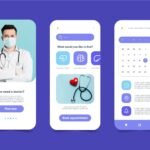Introduction
In today’s digital age, managing health information efficiently is more crucial than ever. With the rise of mobile health (mHealth) apps, individuals can now track their medical records, monitor vital signs, schedule doctor appointments, and access personalized health insights. Whether you want to stay on top of your medications, fitness, mental health, or chronic conditions, there’s an app designed to meet your needs.
In this article, we will explore the top 10 must-have health apps that empower users to take control of their health information, wellness, and medical records.
1. MyChart – Best for Managing Medical Records
Key Features:
- Securely access electronic health records (EHRs) from participating hospitals.
- Schedule doctor appointments and receive test results.
- Communicate with healthcare providers through secure messaging.
- Manage prescriptions and request refills.
Why It’s Essential:
With MyChart, users can maintain their medical history, track past diagnoses, and ensure they stay up-to-date with their treatments.
2. Medisafe – Best for Medication Reminders
Key Features:
- Sends smart medication reminders and alerts.
- Tracks medication adherence and dosage history.
- Supports family notifications to ensure loved ones take their medications.
- Integrates with wearable devices like Apple Watch.
Why It’s Essential:
For those managing chronic conditions, Medisafe ensures that they never miss a dose, reducing risks of complications due to missed medication.
3. Apple Health – Best for Health Tracking
Key Features:
- Centralized dashboard for steps, heart rate, sleep, and more.
- Syncs with various fitness and health devices.
- Stores health records from multiple hospitals and clinics.
- Provides insights into overall health trends and activities.
Why It’s Essential:
Apple Health acts as a one-stop shop for all your health and fitness tracking needs, ensuring a holistic view of your well-being.
4. Google Fit – Best for Fitness Monitoring
Key Features:
- Tracks activity, heart rate, and step count.
- Integrates with popular fitness apps like Strava and Fitbit.
- Provides personalized coaching insights.
- Monitors sleep patterns and calorie intake.
Why It’s Essential:
For Android users, Google Fit is a great way to keep track of daily physical activity and health metrics.
5. Teladoc Health – Best for Telemedicine Services
Key Features:
- Offers 24/7 virtual doctor consultations.
- Provides access to licensed medical professionals for non-emergency health concerns.
- Prescribes medications and treatment plans remotely.
- Supports mental health therapy sessions.
Why It’s Essential:
With Teladoc, users can consult doctors from home, saving time and avoiding unnecessary clinic visits.
6. Doximity – Best for Healthcare Professionals
Key Features:
- HIPAA-compliant video calling and messaging.
- Secure communication between doctors and patients.
- Provides access to medical news and updates.
- Allows professionals to send digital faxes securely.
Why It’s Essential:
Healthcare providers can manage patient communication, consultations, and collaborations efficiently using Doximity.
7. Fitbit – Best for Wearable Health Tracking
Key Features:
- Monitors heart rate, steps, and sleep patterns.
- Tracks calories burned and activity levels.
- Provides personalized fitness and health recommendations.
- Integrates with other health apps like Apple Health and Google Fit.
Why It’s Essential:
Fitbit helps users track health trends over time, ensuring they stay active and healthy.
8. Ada – Best AI-Powered Symptom Checker
Key Features:
- Uses AI-driven symptom analysis.
- Provides detailed health assessments.
- Offers insights into possible conditions and recommendations.
- Stores personal health history for future assessments.
Why It’s Essential:
Ada helps users get quick, AI-based health assessments, reducing the need for unnecessary clinic visits.
9. Headspace – Best for Mental Health & Meditation
Key Features:
- Provides guided meditation and mindfulness exercises.
- Offers stress-relief programs tailored to users.
- Helps with sleep improvement and relaxation.
- Includes specialized content for anxiety and depression.
Why It’s Essential:
Managing mental health is as important as physical health. Headspace ensures a balanced mind-body approach to well-being.
10. MyFitnessPal – Best for Nutrition & Diet Tracking
Key Features:
- Tracks caloric intake and nutrition.
- Provides access to a food database with nutritional values.
- Syncs with fitness and health apps.
- Offers customized diet plans and meal tracking.
Why It’s Essential:
A healthy diet is crucial for overall health. MyFitnessPal helps users stay on track with their nutrition and weight goals.
FAQs
1. Why is managing health information important?
Managing health information ensures that you have accurate records of medical history, prescriptions, and test results, helping in better treatment and diagnosis.
2. Are health apps secure?
Most health apps use encryption and security protocols to protect user data. Always check for HIPAA compliance and secure data storage policies before use.
3. Can health apps replace doctors?
No, health apps are designed to assist users in tracking and managing health, but they do not replace professional medical advice.
4. How can I choose the best health app for me?
Consider your health needs, app features, and user reviews to determine the best app for managing your health information.
5. Are these apps free to use?
Many of these apps offer free versions with premium upgrades for additional features.
Conclusion
Managing health information has never been easier, thanks to these advanced health apps. Whether you need to track medications, monitor fitness, consult doctors remotely, or manage nutrition, there’s an app tailored to your needs. Embracing digital health solutions can lead to better organization, improved wellness, and enhanced access to healthcare services.
Start using these must-have apps today to take charge of your health and well-being!





